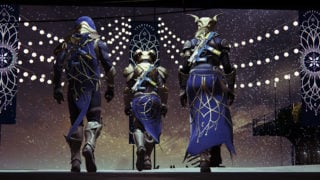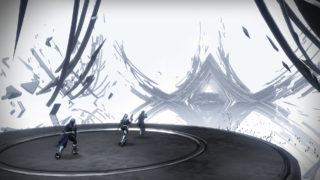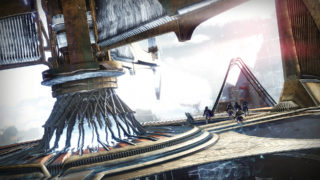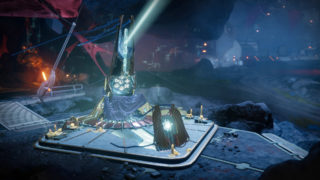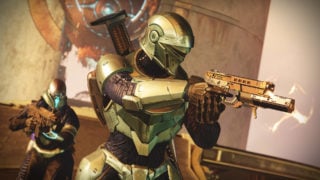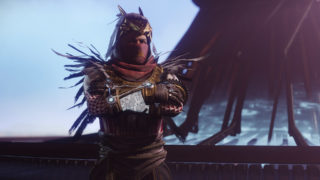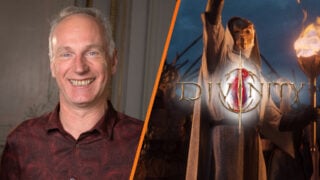Interview: Bungie on the continuing evolution of Destiny
And why it’s a better creator than it’s ever been

Destiny has evolved into a very different beast to the one that first launched in 2014.
Creator Bungie ended its eight-year partnership with Activision earlier this year and acquired the publishing rights for Destiny, giving it full control over the future of the MMO shooter series.
And it has transformed the franchise since, introducing cross-save support in August before launching Destiny’s free-to-play revamp New Light and its Shadowkeep expansion in October, while at the same time making Steam the game’s new PC home.
Speaking to VGC at a London community event this week, Bungie communications director David ‘Deej’ Dague claimed the veteran developer is now better than it’s ever been at creating an evolving experience that meets players’ desires.
“I think we’ve gotten better at understanding who the guardians of Destiny are and investing in the things that are more meaningful to them,” he said.
“The new seasonal model is loaded with different quest lines that can lead to exotic weapons, different events, different surprises… we’re better at understanding what makes players happiest and doing those things.
“Whereas before, Destiny was a game that people experienced once, watched the cut-scenes once, threw the game over their shoulder, looked at us and said: ‘OK, what’s next?’ I think we’re getting better at sustaining a lifestyle and a hobby game, instead of something that is perishable.”
VGC spoke to Dague alongside producer Rachael Levine.
Today is your community day in London. How important is it today, with more and more platforms arriving, that you keep that community together?
Deej: Community is the reason why we make games at Bungie. We quite literally have a company purpose of, ‘create worlds that inspire friendship’.
So the community is the product as much as the game. We see the game as a platform and a catalyst for bringing people together who would never have met before, let them share amazing experiences together, let them create fantastic characters together and perfect them over time, and then form lasting bonds of friendship that help the game transcend a limited license for a piece of software, and become a place where you can go and visit your friends.
Community events like this, where we can gather people together in real life, step beyond the avatar and really get to know each other as people, with an interesting, common bond… those are my favourite moments of working for Bungie.
Levine: I 100% agree. This is my first time coming to one of these events and I’m really excited to meet all of the community personally. In terms of our studio’s goal of ‘game worlds that inspire friendship’, when New Light launched I saw this resurgence of people around me wanting to come back to Destiny. I also had this really cool opportunity to engage with my personal friends who hadn’t previously played Destiny to join us, because it was a new avenue for them to come into the game.
Destiny is now on more platforms than ever, most recently launching for Steam and Stadia. You’ve enabled cross-save, but do you still have plans for cross-platform play? And what challenges do you need to overcome to make it happen?
Deej: We’re certainly keen to explore anything that would bring players together so that they can share their experiences. Like I said, it’s sort of our mission as creators of entertainment. In terms of the challenges, they’re always the same: it’s allocation of resources, it’s developer hours, it’s all of the things that we have to do.
We make guided decisions as to where we want to invest our time: what sort of features do we think will be most useful to players? What things can we do to evolve the world of the game to keep people engaged and entertained?
While we don’t have any promises to make about new features that will come online in the future, I can assure you that there is always a lively conversation at Bungie – as there was for years before we arrived at even cross-save – about things that we could do that would be good for players, and that we want to find the time and resources to invest in and bring to fruition.
With your focus on community, how fortunate are you that most platforms seem to have a very open approach today to initiatives such as cross-save and cross-platform play?
Deej: Yes, we’re very fortunate. We definitely like to be at the forefront of this industry when it comes to bringing people together in new and exciting ways. I have been a player of Bungie games since 2001 and still play Bungie games with people I met back then, so I have relationships that are 15 years old that are the most stable friendships I’ve had over time.
Coming to work for Bungie, I wanted to pay that forward to an entirely new generation of gamers and all of that has exploded in ways I couldn’t have anticipated. The Destiny community has sort of outmatched any of my hopes and dreams. They’re an amazing group of people and that’s our pride and joy. They’re welcoming to new members and appreciative of each other’s triumphs.
Levine: I’m excited to meet people [tonight]. I’ve engaged with the community in a digital way on forums, but I want to engage with the content that I build and get a sense of if they’re enjoying it and what I can learn to take back to the developers in Bellevue.
“Bungie is far more international than it has ever been… We have professionals based in Paris, Hamburg, Amsterdam, Luxembourg. Those used to be our Activision colleagues, but now they’re our Bungie team mates.”
Both Xbox Series X and PlayStation 5 are coming next year with backwards compatibility. Is Bungie prepared to ensure Destiny players have a great experience when they move over to those consoles?
Deej: We want to make sure players have a great experience on any platform where they can play Destiny. Given that those [Xbox Series X] announcements are less than a week old, I’m in no way in any position to make any promises as to how that is going to work.
But can your players be confident that new consoles are not something you’re going to be blindsided by?
Deej: No, certainly not. If our players can be confident of anything, it’s that we are at their service trying to provide as good an experience to them wherever they decide to play, and that there are no second-class citizens in our community. Everybody is served and rewarded equally.
Many console players will be envious of the 60fps gameplay available with the PC version of Destiny 2. Could console players possibly look forward to a performance upgrade now that new platforms are on the horizon?
Deej: We’re always looking to optimise the performance and the quality of the Destiny of experience. It’s all a matter of priorities. We want to create a world that is beautiful and makes no compromises in terms of art, a world that feels alive and you’re interested in exploring because it captures your imagination. At the same time, we want to make the game as fluid as possible.
We’ll place those bets and we’ll double down in the places that we feel are more meaningful. That’s sort of the debate that rages inside of the studio between arts, engineers and optimisation professionals. There’s certainly nothing that I can make promises about right now, but I think the aesthetic at Bungie speaks for itself and our commitment to quality and excellence is exhibited by the people who care deeply about what happens in the world of Destiny because it’s captured their imagination.

You’ve mentioned balancing the studio’s resources a few times. Is that something you have to be more disciplined about now that you’re independent of Activision?
Deej: That has always been the case. We’ve always needed to be disciplined about how we make our decisions and where we dedicate our effort. We’ve certainly been more accountable this year, because we’ve been responsible for creating all the things that we accomplished on our own.
The thing that I love is that I now get to be here in the UK, with a Bungie that is far more international than it has ever been. I have my colleagues here in the community team, serving the French and the German players in their own market.
We have professionals based in Paris, Hamburg, Amsterdam, Luxembourg… those used to be our Activision colleagues, but now they’re our Bungie team mates. So it’s interesting to see our company evolve and become more international and more prepared to truly serve the global community that has surrounded this game.
Destiny 2 has recently embraced the seasonal model. How do you think that’s gone?
Levine: The thing that we want to achieve with the season model is to be able to tell a longer story, to be able to start something and come to a conclusion of that story… something that will change over the course of a season. In addition to that, we learn from each of our activities during a season and look at how we can take those learnings moving forward.
The Menagerie mode is a great example. This was a really great thing that our community loved, so we dedicated resources to look at how we could build that and still keep it accessible. We took that existing mechanic and applied it to Season 9 with The Sundial, which is a slightly smaller version but still exciting.
Deej: Tactically, last year with the seasons we were able to embrace this expectation that the game would change from one season to the next. It’s an opportunity for us to address combat balance and reward economies on a seasonal basis, so players could expect that cadence. You would get new challenges, new experiences to master and the world to evolve based on feedback on a seasonal basis.
The way that we’ve evolved that this year is that from one season to the next we’re continuing the story that will then evolve over time, where as last year Ada-1 and The Drifter probably weren’t even aware of each other… there was no logical hand-off from one experience to the next. This year, as you defeat The Undying Mind, you free Osiris from the Infinite Forest who then steps forward with a whole new scenario for you to tackle.
“Before Destiny was a game that people experienced once, watched the cut-scenes once, threw the game over their shoulder, looked at us and said: ‘OK, what’s next?’”
Of course the business model behind Destiny has been evolving as well, with the free-to-play version launching this year. How much freedom does it give you to not necessarily have to worry about justifying a full-price release every year?
Deej: I think we have embraced some new business models that have enabled us to appeal to different types of players in new ways, and create a situation where it’s easier to join the Destiny community. I wouldn’t say that this has had a measured impact on our design goals.
We still want to create a big, beautiful world that’s worth exploring, with a variety of challenges that appeal to every type of player. We’re still as dedicated to quality as we’ve ever been, we still want to surprise and delight players with new experiences to master.
Levine: I would say there’s no real difference [since going free-to-play]. I think people are holding themselves to a higher standard. We still want that opportunity to create really great experiences for the community and knowing that we don’t have those other studios to back us up anymore, we want to still give you guys the chance to engage with us at the same level.
Deej: I think we’ve gotten better at understanding who the guardians of Destiny are and investing in the things that are more meaningful to them. A cinematic campaign that you could speedrun over the course of several hours is something that we tried to deliver.
The new seasonal model is loaded with different quest lines that can lead to exotic weapons, different events, different surprises… we’re better at understanding what makes players happiest and doing those things. Whereas before, Destiny was a game that people experienced once, watched the cut-scenes once, threw the game over their shoulder, looked at us and said: ‘OK, what’s next?’ I think we’re getting better at sustaining a lifestyle and a hobby game, instead of something that is perishable.
Up until now you’ve used the Eververse service to sell in-game cosmetics. Could we start to see those made available via drops in the future?
Deej: There’s no telling how the future may impact things like Eververse or any in-game economy. Season after season we take the opportunity to adjust those things. Even with the beginning of Season of Dawn, Eververse underwent some change that was heavily motivated by player feedback. The beginning of a season is the chance for us to address the things that need to evolve and to adjust.

You recently released Destiny 2 for Stadia and it’s been a little bit tough for players to group up due to the comparatively small size of that player base. Does Bungie have any plans to help solve that?
Deej: I would invite anybody who is looking for friends to play Destiny with to migrate over to Bungie.net. We have LFG [looking for a game] tools and we will solicit the ability to find friends and team mates to take them through any experience that they have in mind. If our tools on the platform that we provide aren’t acceptable, we’ve always found the community to be inventive enough to go and find their own spaces where they can help new players. Any strong online community benefits from new blood and a welcoming recruitment acumen and I think our community discovered that a long time ago.
Do you have any plans to improve the endgame for PvP players?
Deej: There has been conversation at Bungie about a reinvestment in PvP and I think you started to see the beginnings of that last season with Crucible Labs. As a member of the community team I love Crucible Labs, because it is this great means of collaborating with players and giving them a voice in our creative process.
So if we told them we wanted to improve Elimination, Crucible Labs is this experimental zone where you can find three different ways to enjoy that type of combat. Through your conversations, general consensus and just the data that you log by playing, we’re going to get a sense of which version is best and make it a more permanent playlist inside of the game.
When is Trials coming back?
Deej: We have no announcements to make about Trials at this time.
Destiny was famously billed as a 10-year experience. You’re over halfway through that… so how do you feel about the next five years and beyond?
Deej: Our goal for Destiny was always to create an adventure that would unfold and evolve over time… and we’re getting better at doing that more quickly now. At the same time, the community that has made this game its home is our pride and joy as a company and we’re going to continue to serve them, learn from them and combine that with our own inspirations for where we want to take it. We are thrilled with the year that we’ve had with Destiny and we want to add to it.





